Operatoonity.com review: The Siege of Calais presented by Glimmerglass Festival
Live performance: Monday, July 24, 1:30 p.m.
Alice Busch Opera Theater, Cooperstown, New York
Music: Gaetano Donizetti
Libretto: Salvadore Cammarano
3.5 out of 5.0 stars

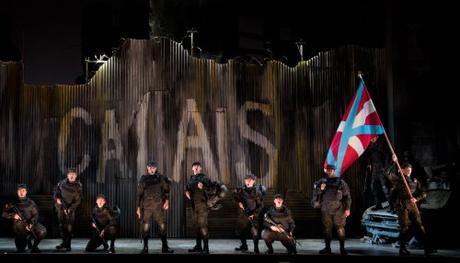
The Glimmerglass Festival’s 2017 production of the American premiere of Donizetti’s “The Siege of Calais.” Photo: Carrington Spires/The Glimmerglass Festival
This summer Glimmerglass Festival took on a seldom-seen Donizetti work, The Siege of Calais. To their credit, the production dramatically underscored the centuries’ old adage: “War is Hell,” famously attributed to General Sherman during the U.S. Civil War. How many times has that sentiment been uttered by not-so-famous conquerors and conquests alike? Many of us are thankfully spared the scope of war’s true horrors.
The Festival’s Calais reminds us the devastation caused by war is as real today as when that siege occurred on the port city on the Northern coast of France during 14th century. Director Francesca Zambello sought to connect the crisis in medieval Calais to war-torn Syria in this century. A blockade ordered by Edward III resulted in besieged civilians lived in abject agony with no fresh food or water–some of who resisted, many of whom had no hope. Her association was apt and the message received.
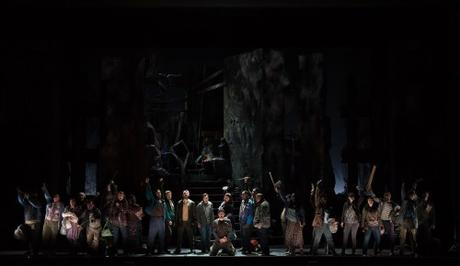
“The Siege of Calais” | Photo: Carrington Spires/The Glimmerglass Festival
The functionality of the spinning set mirrored the vicious cycle that ensnares those living in war-torn towns and cities, past and present. A towering ruin slowly whirled around to reveal the bombed-out shell of a building, just different faces of the structure depending on the degree of rotation. Each turn showed the audience facets of a town where no one would have chosen to live but who lived there just the same.
The leading roles in this work were both sung by women, soprano Leah Crocetto and mezzo Aleks Romano, with Romano singing a trouser role. During the show talk, the presenter said the Donizetti, who wrote many more operas besides the ones most people know, always wrote to the talent pool available and that no tenors impressed him at the time. For that reason, he made the male lead a mezzo. The show is also not a prima donna-centric work–no opening aria signalling, “Hey, operagoers. I’m the reason for attending this show. Here’s my opening aria.” That choice made it unpopular and almost uncastable.
So Calais did not follow the expected formula of the time to attract the most highly touted sopranos in Donizetti’s day, but this production certainly featured a classically talented prima donna in Crocetto.
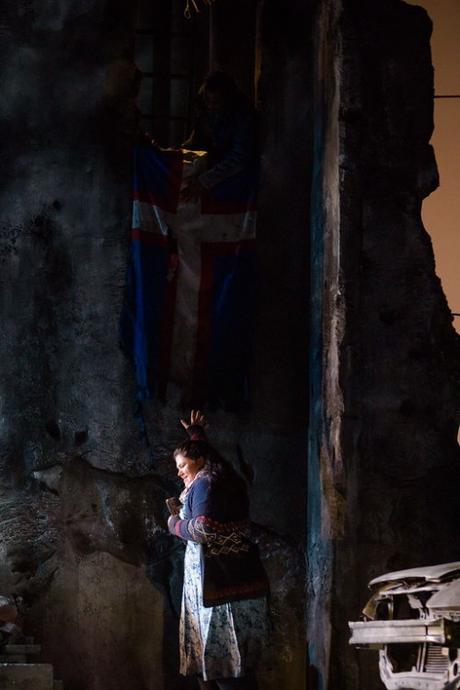
Leah Crocetto as Eleanora in The Glimmerglass Festival’s 2017 production of the American premiere of Donizetti’s “The Siege of Calais.” Photo: Carrington Spires/The Glimmerglass Festival
The garbage-strewn stage stands at odds with a bel canto style opera. It is Crocetto’s powerful and pure soprano voice that ushers in the bel canto, the beautiful singing, the opera requires. Her performance was rich and nuanced. While evidencing genuine despair, frustration, loss, and other strong emotions, her technique never faltered.
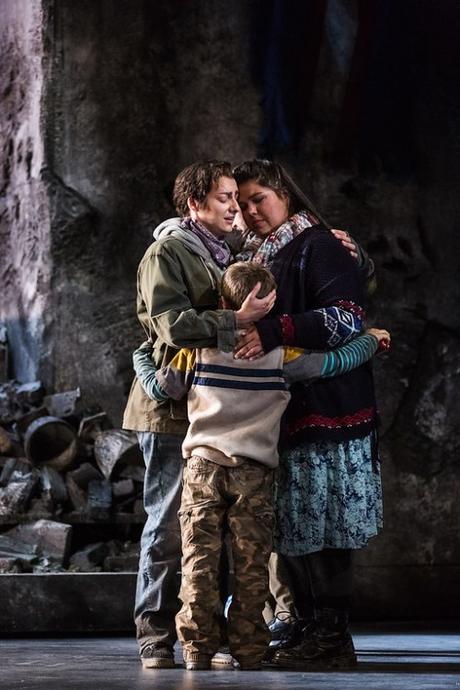
Aleks Romano as Aurelio, Rock Lasky as Filippo, and Leah Crocetto as Eleonora in The Glimmerglass Festival’s 2017 production of the American premiere of Donizetti’s “The Siege of Calais.” Photo: Karli Cadel/The Glimmerglass Festival
Cast as wife and husband, together she and Romano sang beautifully and believably all the music Donizetti created for two complementary women’s voices.
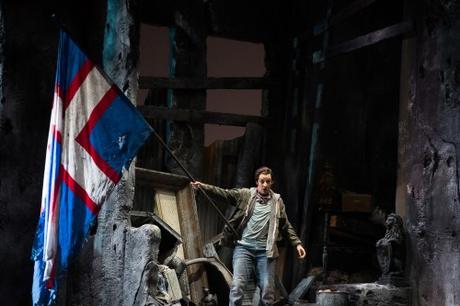
Aleks Romano as Aurelio in The Glimmerglass Festival’s 2017 production of the American premiere of Donizetti’s “The Siege of Calais.” Photo: Carrington Spires/The Glimmerglass Festival
A trouser role in a dramatic opera is a devilishy difficult role to play just right. As Aurelio, Romano had the appropriate amount of swagger and male physicality to suspend our disbelief that these two characters deeply loved one another as man and wife. Her voice was a strong and facile instrument, which sounded at its most beautiful when paired with Crocetto’s.
Young Artist Adrian Timpau delivered an outstanding turn as Aurelio’s father, Eustachio de Saint Pierre, mayor of Calais. He sang the role with gravity and sensitivity, never losing his conviction, despite the odds of saving his town mounting with each day his war-torn city is under siege.
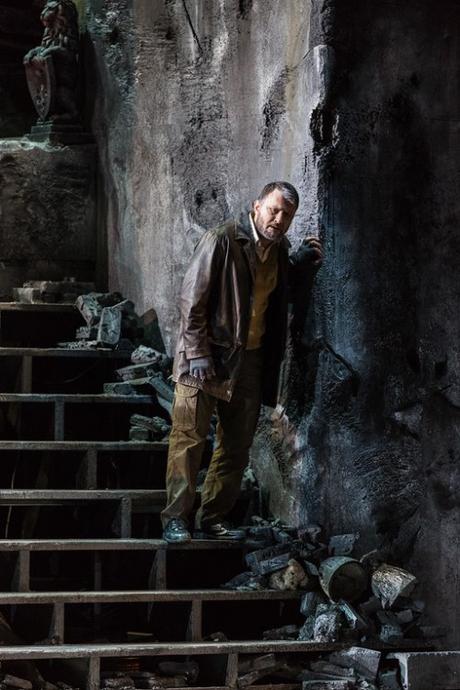
Adrian Timpau as Eustachio de Saint-Pierre in The Glimmerglass Festival’s 2017 production of the American premiere of Donizetti’s “The Siege of Calais.” Photo: Karli Cadel/The Glimmerglass
Under Maestro Joseph Colaneri’s baton, the orchestra is in fine and varied form–brassy and militaristic, and at other times, pensive and atmospheric, matching the emotions on stage.
In this piece, Donizetti opted for more ensemble numbers than arias, and all rang gloriously throughout the house. After all, resistance makes for impassioned singing and captivating choruses.

In sum, directorial vision was sound, the staging and lighting were arresting, and the voices soared. So, why 3.5 out of 5.0 stars? Sometimes, pieces fade in the repertoire because they should fade, because they are flawed. They lack excitement, memorable music, and sufficient onstage action.
A convention hailing back to the Ancient Greeks of never showing audience violence onstage, but rather, speaking of it once the deadly deed has been done, handicaps theatrical works presented in the 21st century. It may have been a convention honored by Donizetti, but it is far less appreciated by today’s audiences, sorry to say.
When the piece premiered in 1836, it included a lengthy ballet–a device Donizetti hoped would provide its entré to the Paris Opera. Thankfully Glimmerglass jetéd his ballet scene. If this opera tended to be dull without a ballet, imagine the piece with one!
It was a noble intention to breathe new life into this rarely done work. Sometimes good intentions just aren’t enough.
* * *

